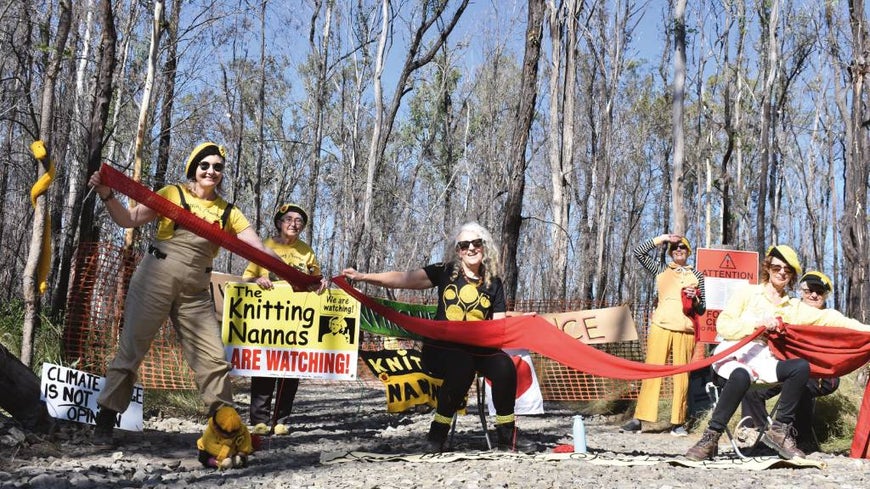The eco warriors protecting the environment for generations

Written by Beverley Hadgraft for Australian Seniors.
Long before climate change was on the global agenda, seniors all around Australia were fighting tirelessly to conserve natural ecosystems for generations to come.
In 1979, Nan and Hugh Nicholson gave a speech at The Channon markets in northern NSW. Logging of an old-growth rainforest bordering their farm at Terania Creek was about to start, they explained. They’d been writing letters and lobbying MPs for four years.
When the markets finished, Nan and Hugh went home with about 300 new friends who camped on their property. They formed barricades in front of bulldozers and climbed trees so they couldn’t be felled. More than 100 police descended, dozens of protesters were arrested and helicopters whirred overhead in unprecedented scenes.
Nan, now 64, says the government’s subsequent announcement it was halting logging to conduct an environmental impact statement was “the most euphoric moment of my life”. Today, Terania Creek is part of the World Heritage-listed Nightcap National Park, home to species that exist nowhere else in the world.
Seniors show long standing impact fighting for the environment
Nan and Hugh have been described as the “Mother and Father” of environmental protesting. And they’ve never stopped. “The only blockades I regret are the ones I didn’t go to,” Nan laughs. The couple now live in The Channon, where they run a small natural campsite with koalas wandering through. Nan is also reforesting the public local creek.
“It is an action of hope. Trees I planted last year have blue wrens nesting in them.”
They have been watching the progress of the regrowth of the Terania rainforest after it was ravaged by bushfires last November, and they plan to carry on their campaigning.
“My project now is to stop all native forest logging,” says Nan. “People tell me: ‘You don’t need to do any more. You’ve done enough in your life.’
“But that’s utterly ridiculous. It’s akin to being in a lifeboat and me saying: ‘Well, I bailed in a lifeboat 20 years ago. I don’t have to bail any more.’ Besides, there’s a lot of joy in causing trouble! Even if you lose, your self-esteem is intact.”
She doesn’t believe protesting needs to be downbeat, particularly if children or grandchildren are involved.
“You don’t want them to see adults depressed and despairing. Besides, getting active is the antidote to anger and depression.”
“COVID-19 has shown what we can do when we get together and perhaps we’ll use that to tackle climate change.”
The Knitting Nannas take on coal seam gas mining
There can be no group of protestors having more fun than the mischievous Knitting Nannas Against Gas. They are a group “in their prime”, as they say, who pull out camping chairs, table and lace tablecloth, and sit and knit as a form of environmental protest against mining coal seam gas (CSG), or any other example of “rapacious greed”.
Sometimes they’ll shell peas, do crossword puzzles or exchange recipes, and they once did a “soft lock-on” when they made sashes declaring ‘No Water, No Life’ and used them to attach themselves to the bars of the NSW Parliament House fence. “It was very colourful and very noisy,” laughs ‘Nanna’ Judi Summers, 65.
It was also fun – and as usual left police and politicians baffled as to what to do with these mild-mannered ladies.
The Nannas were formed in 2012 after co-founders Clare Twomey and Lindy Scott, already members of their local anti-CSG activist group in northern NSW, decided to do some surveillance, and discovered a holding pond for CSG wastewater, which they believed would be toxic.
As they discussed a peaceful but effective way to protest, Lindy, who had just become a grandmother, was knitting a pair of booties for her grandson, explains Judi. And so the idea of KNAG was born.
Senior women bring environmental issues to the forefront
The group is not aligned to any political party, but has a close affiliation with another NSW coal and gas protest group, Lock the Gate. The Nannas decided to wear deliberately nanna-ish outfits in the Lock the Gate movement’s distinctive yellow and black, and became regular fixtures, knitting stubbornly at work sites, rallies and blockades, and outside politicians’ offices. (The NSW government says further development of the CSG industry is essential to improving the state’s gas security, meet growing energy needs and contain household energy bills.)
Although knit-ins may not look radical, the Nannas led the celebrations in 2015, when a local gas company agreed to accept a NSW government offer to buy back its exploration licences. The success of the original northern NSW group has inspired many other groups of Nannas – or ‘Loops’ as they are known – including dozens across Australia, and more overseas in Europe and America. The groups focus on a variety of local environmental issues, from coal mining to forest destruction.
“We’re very effective, we know what we’re talking about,” observes Judi of her group. “Two or three Nannas are retired journalists. We also have Nannas who are researchers and they gather the data for CSG or coal.
“We’re also effective because we’re a disorganisation. No-one can touch us. We have no hierarchy. We don’t make light of the issues but we do have fun doing what we do.”
Seniors in Australia have their say on the environment
Statistics from the Australian Seniors Leaving a Legacy survey
- 92% hope to leave behind a positive environmental legacy by leaving the planet a better place for younger generations.
- 86% say leaving an environmental legacy is more enduring than leaving a financial legacy.
- 54% say environmental impacts are among the greatest concerns they have for younger generations.
- 97% partake in environmentally-conscious activities such as reusing household goods to reduce waste.
- 86% think that younger generations could learn from seniors by tackling their throw-away culture.
Read more about environmental issues in the Leaving a Legacy survey
22 Feb 2021